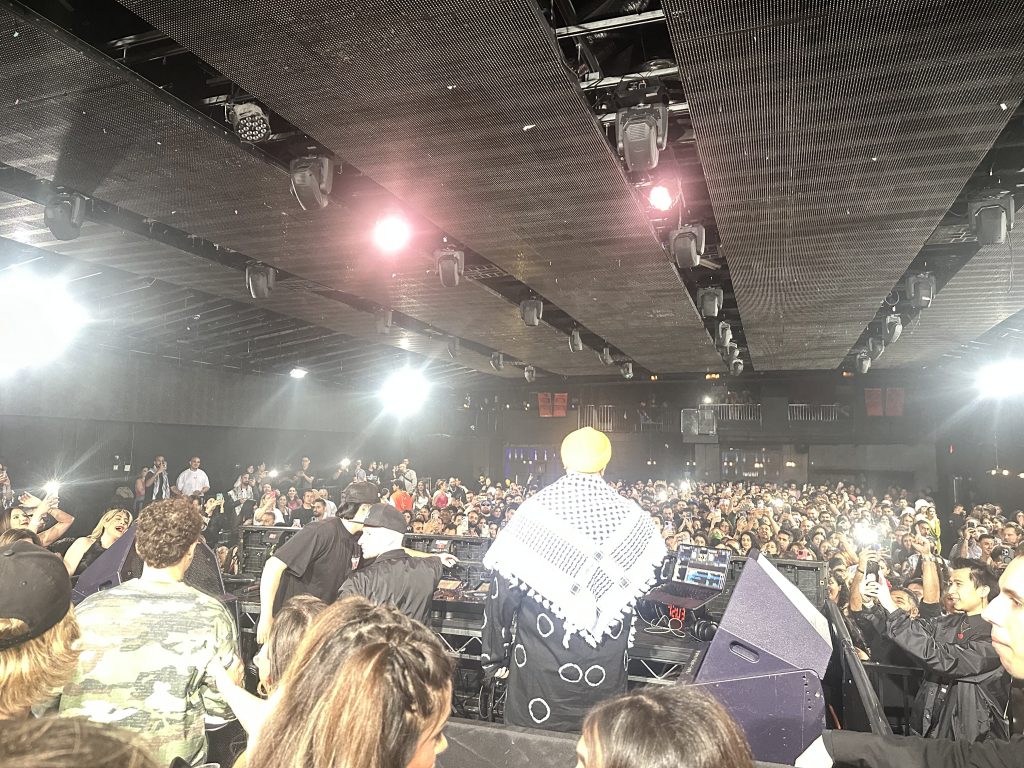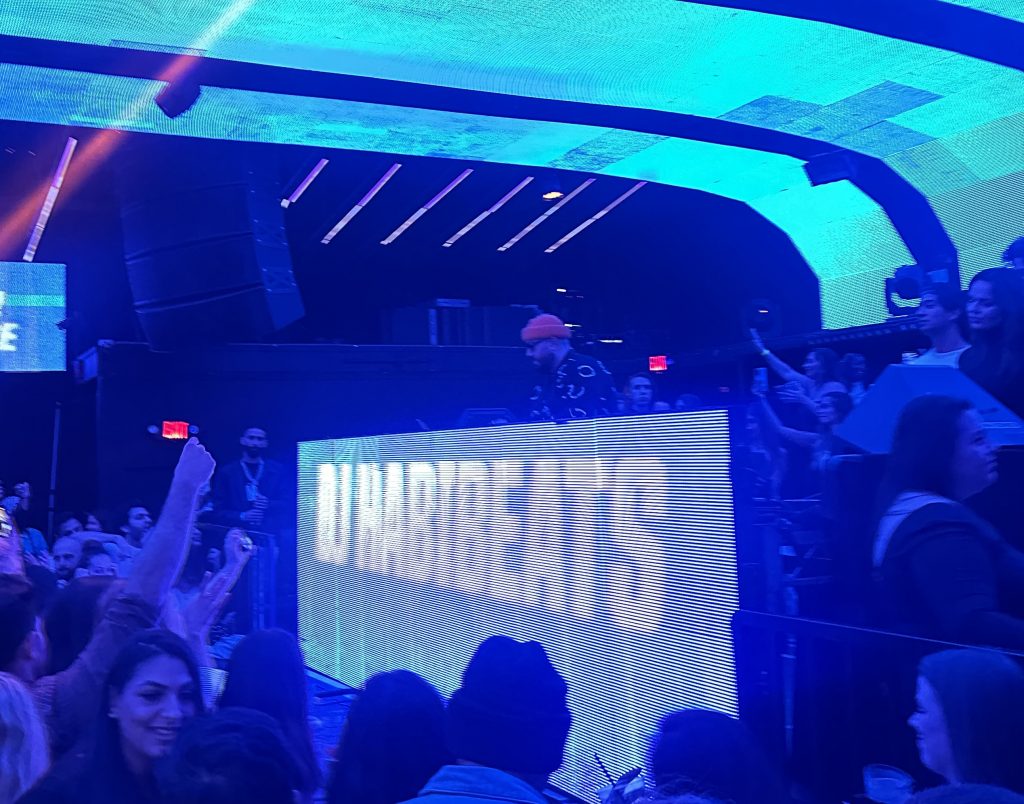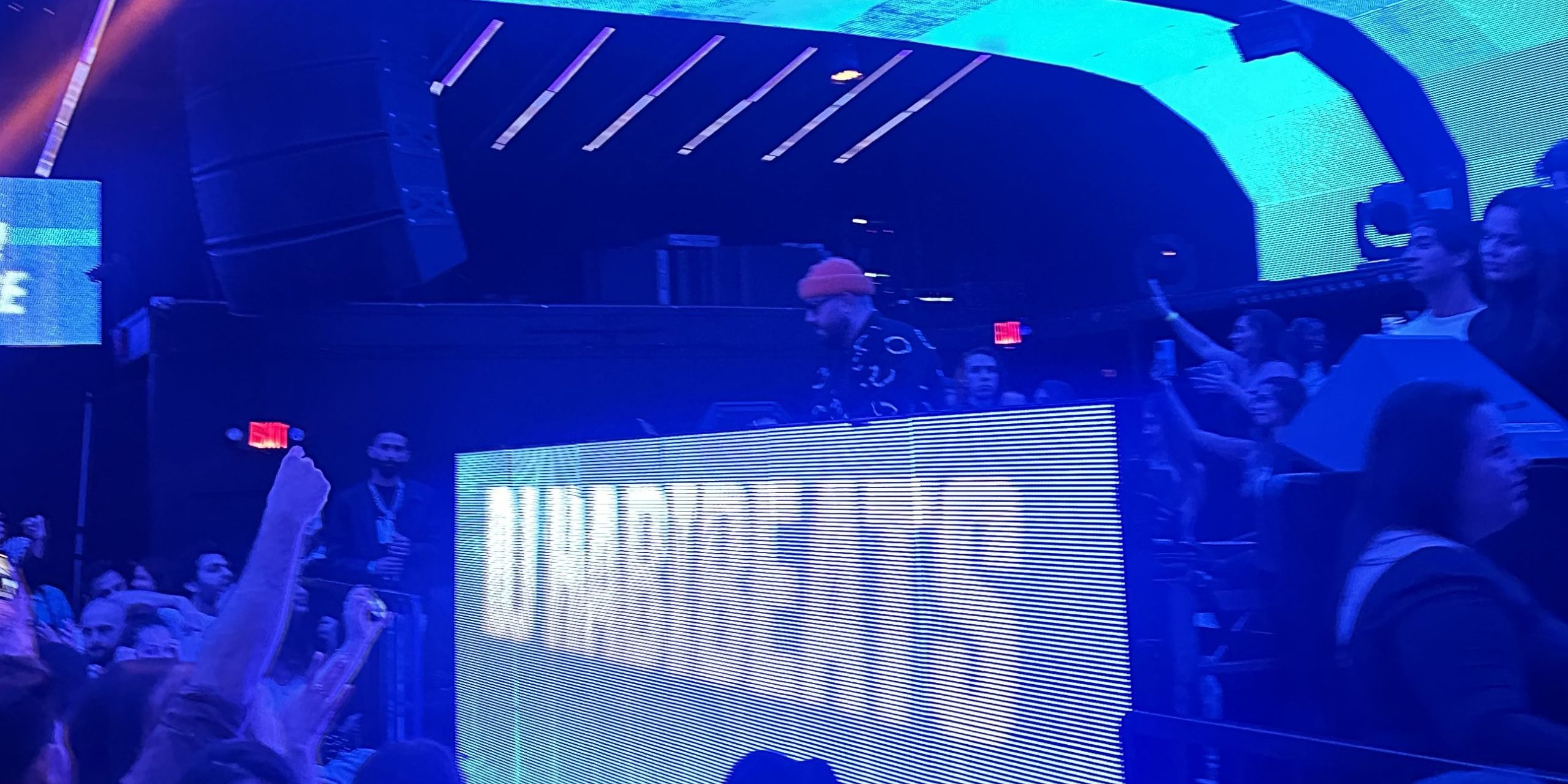From starting Habibi’s House party in 2021 with modest crowds to celebrating two back-to-back sold-out shows in LA a few years later, Ibrahim Abu-Ali, AKA DJ Habibeats, is triumphantly growing and forging paths in the music industry for third-culture artists along the way. His new song ‘Wala’ is coming out June 7th. I had the pleasure of speaking with him before his revitalizing set at the Academy LA.
Ali: It’s very nice to meet you. I wanted to touch base about your background, where you grew up, and what influences your music the most.
DJ Habibeats: Yeah, so I was born and raised in San Francisco/ the Bay area but my family is Palestinian originally from Ramallah. I lived in San Francisco for the first six years of my life, then moved out to a suburb an hour away, then moved back to San Francisco for college. I always had a lot of family in SF so I was in and out a lot growing up. The reason I got into DJing was my Khalo (uncle). So my uncle is a DJ, and he was DJing a lot in the 80s, 90s, and 2000s. He would do a lot of house music and freestyle stuff, but also mixed in Arabic and all these other cultures. He did a lot of world music events, and I always thought it was just the coolest thing on the planet. So when I was like 13, I asked him to teach me how to DJ, and he did. Pretty much from then on, I grew a sense of love for DJing. I started to consume different types of music. I was a big hip-hop head growing up, I loved R&B as well. I also obviously grew up with a lot of Arabic music in the house, and at weddings and parties. It’s very much a third-culture kid experience, right? Someone who grew up as a kid of immigrants. I think we can all relate that way. It doesn’t matter what culture you come from, that third culture kid experience is very specific, where you have one foot rooted in your parents’ culture and how they raise you, and you have the other rooted in like the West, and you can meld those two things together. I think that the best way to describe my inspiration is melding those two halves of myself.
Ali: That’s beautiful. I grew up and was raised in Saudi, so I’m not fully a third-culture kid, but I grew up with Western influences, so I resonate with the idea of melding those two sides. You know, there’s so much grief right now that we’re all feeling as Arab individuals, as humans, as people with consciousness, so I wanted to ask you, how do you contend with balancing a very joyful creative output with what’s happening right now in Gaza? What do you think your role is as an artist at this current time?
DJ Habibeats: Yeah, it’s a good question. It’s a difficult balance, to be honest. I’m sure you probably resonate with this. On one hand, just existing in the West is a weird balance. My whole life. I’ve always had this survivor’s guilt, a feeling of why I get to live this comfy life out here. While, these people who are like family, my people, are in very different circumstances. I think to myself, if my parents didn’t emigrate, what would my life be like? I think we all have that as a baseline, which is a crazy baseline, right? On top of that, you know, you have the horrible, horrible atrocities of the genocide that’s happening and as a creative whose job it is to literally party, it’s a weird thing to reconcile. I’ll be honest with you, especially at the beginning of this horrible genocide, and until now obviously, but especially at the beginning, I had all of these self-questioning moments where I was like, okay, do I cancel all my shows? Like, what do I do? You know what I mean? I went to people who I trusted, people I looked up to, and to family and friends because I was really grappling with it, and I think the kind of resounding advice that I got was: the thing you are good at is bringing together our community and spreading joy and love. More importantly, sort of exposing the world to the fact that we exist, we’re here, and we’re not going anywhere. And that we shouldn’t only be known for tragedy and suffering, we can have fun, we have art, we have music, we have culture. We’re a beautiful culture that’s meant to be celebrated, shared, and experienced. It’s a shame that people only think of us as this monolith of a horrible, sad experience of war and bombings. The people in my life told me: look, this is the thing you’re best at, and it’s what people love you for, and why they come to your shows, and the more that you can put our people on a platform in a positive light, the better that is for us, so keep on doing what you do and just do it with that love in your heart and do it with that kind of intention in your head. And so that’s the way that I, you know, move forward. I can tell you that so many people have come up to me or messaged me and said how cool it is to have a space where we can all meet together, and we can like, feel comfortable with each other and express ourselves loudly and proudly. People say it’s therapeutic for them, which is really cool. I’m just happy that we’re here, you know, and that we can be here and we can be proud. But I’m not gonna lie, it is a complicated feeling for me in existence. But at the end of the day, most people tell me all the positive things that they get out of it, and that really keeps me going.
Ali: Yeah, I think it’s important to balance out the really intense darkness with moments of light, because otherwise, there wouldn’t be any balance, we wouldn’t find any perspective of where we wanted to head as a culture and a group of people. On another note, I wanted to ask you as an artist and through your journey, what was the moment that you started to gain traction? What did that feel like? How did that evolve into your connection with GrassFed (label)?
DJ Habibeats: Shit, there were a couple of key moments. So the first one was 2021, during the pandemic, at the end of it, I started, I was in my last semester of law school, and it was like, Zoom law school, which was the worst thing on the planet, just stuck in my room, I couldn’t DJ, I couldn’t do anything. So I started a TikTok account just to have a creative output. I would upload videos onto there, and a lot of the videos I uploaded were hip-hop sample breakdown videos, explaining how they used it. Those videos went super viral, I made so many of them. So like, within a few months, I gained 500,000 to 600,000 followers. It had nothing to do with Arabic music, it was just me being a hip-hop head and nerding out about music and doing turntable stuff. At some point, I decided I wanted to start making my own. I wanted to start producing music, and I wanted to produce music that involved my roots. The problem is most mainstream places and clubs don’t care for that at all. They just want to hear Top 40 stuff. I needed to create a space where I could play what I wanted. So I had the idea to make my party, Habibi’s House. The first one 80 people came in, it wasn’t huge, but everyone had the time of their lives. It felt like for the first time in my life as a DJ that both halves of my brain were one because I was playing hip-hop stuff but also Dabkeh, and it just felt like I was in this zone. Some clips from that went kind of viral. So the next party had like 300 people or something like that, then the one after that sold out, and then they just kept selling out. And then I’d get to bigger venues, then people in other states would be like, when are you going to do this in New York or wherever? So then I started branching out and eventually got to a point where a friend of a friend of mine, who is friends with GrassFed, I was talking to him about being really overwhelmed with all these opportunities and stuff, and I want to focus on the music, so I think I might need management or some help. And he introduced me and that’s pretty much it.
Ali: With that being said, Do you have any advice for younger artists?
DJ Habibeats: Yeah, I would say, general advice would be to just do the thing that you genuinely fuck with the most. Because anything else is just not gonna come across to people as interesting or genuine, especially if it’s something that you’re doing because you’re trying to cater to other people, you know what I mean? I think the artists that I love the most, that I really resonate with, those that just hit me the deepest, are usually not Top 40 artists, and usually they’re really niche. They’re artists that do a specific thing and they’re so good at that thing. And, and that’s the kind of connection you want to build with people. But you can’t do that if you’re doing really generic stuff. And we live in a world now luckily, where there’s the internet, and there’s TikTok, and you can grow a huge community. And it could be that you can support yourself with it, and you can grow with it. For the longest time, I think I wasn’t even doing what I really wanted to do at my deepest level. I always think to myself, man, it’d be so cool if I could play this kind of music and that kind of music, but nobody wants to hear that. But they do want to hear that. It’s just about connecting with those people. And then I would say the other half of it is output, you just have to work. There’s some luck element. But there’s a sort of talent element, obviously, and then there’s just hard work and consistent output. Just keep doing stuff. Then all you need is one thing to kind of hit and then that gets you a bigger community and then you can say, okay, cool, that hit so I could go kind of down that road a little bit. It’s just about consistency. You’re gonna fail 100 million times before you get that one moment where something actually hits and something happens. I’ve played a lot of rooms with nobody in them or even just 10 people, and I’ve made beats and remixes that flopped and nobody cared about. That’s going to happen but it’s just about believing in yourself, putting in the work, and then outputting, and then waiting for that moment when something just resonates and hits. So that’s that’s kind of my advice, Be true to yourself and have consistent output.

For DJ Habibeats, music is not merely a reflection of the times, it is a battleground where the preservation of our culture hangs in the balance. In recent months, we have witnessed not only the physical destruction of the Palestinian people but also the insidious muting of Arab voices in the industry. It’s a form of cultural genocide, a deliberate attempt to erase our presence from the narrative.
But tonight, as I stand here on this stage, I see clearly that our culture will continue to thrive. The music is a rallying cry, a celebration of our identity, and a challenge to those who seek to diminish us. With each beat a reclamation of our heritage, infused with the modernity and finesse of an artist whose ears recognize the future of Arabic music and the wider role it can play in the industry.
Being embraced by Ibrahim and his team at GrassFed feels like a breath of fresh air in an industry often tainted by exclusivity and elitism. Their commitment to inclusivity and kindness speaks volumes. In their embrace, I find not only validation for my presence but a sense of belonging that is truly priceless, especially for someone who wants to work in an industry that often feels like it is working against you.
DJ Habibeats is the conduit at the center of celebrating the collective voices of Arab artists who have too often been sidelined or silenced. Amid the music pulsating through the air, I am reminded of the power of our culture, heritage, and stories. Each beat and lyric from different eras of Arabic music is an amalgamation and testament to our culture’s resilience, and defiance against those who seek to erase us.
Amid state violence and obstruction of sovereignty in Gaza, the West Bank, and bifurcation of Palestinian culture– partitions, boundaries, borders, and frontiers represented a blockage from Palestinians and home. DJ Habibibeats’ house music created a physical embodiment of a cultural homage in the form of a literal blend of sound from Palestine to Los Angeles: a testament to a home that cannot be contained within bounds.
So I take a moment to soak it all in, the lights, the music, and the joyous energy of the crowd. Ten thousand miles from my hometown, I find myself at the epicenter of a movement, a beacon of hope for Arab artists everywhere. As I raise my hands and shimmy along, I am filled with a sense of pride and purpose of where we can collectively move through the industry and build bridges of collaboration and community.
DJ Habibeats’ new song ‘Wala’ comes out June 7th.





